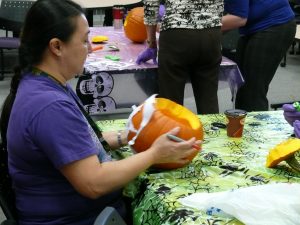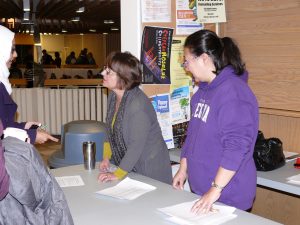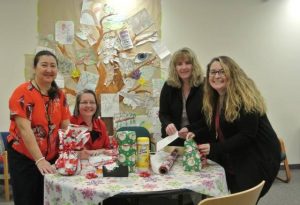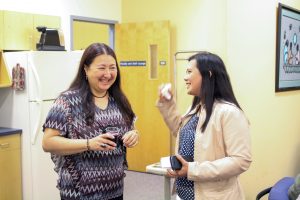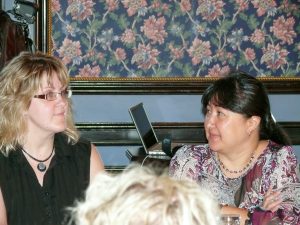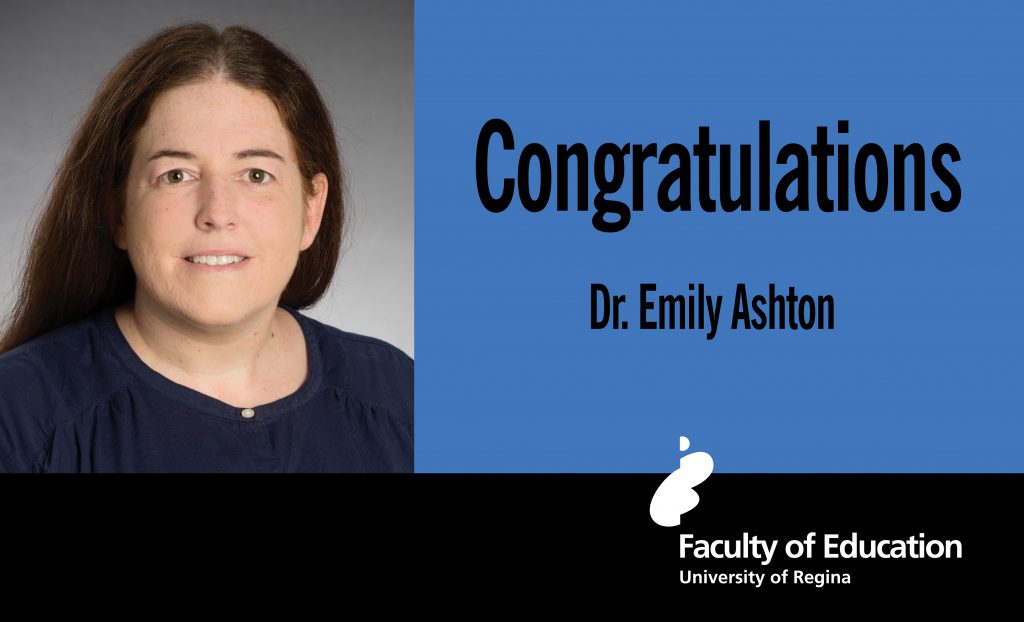
Author: Editor Ed News

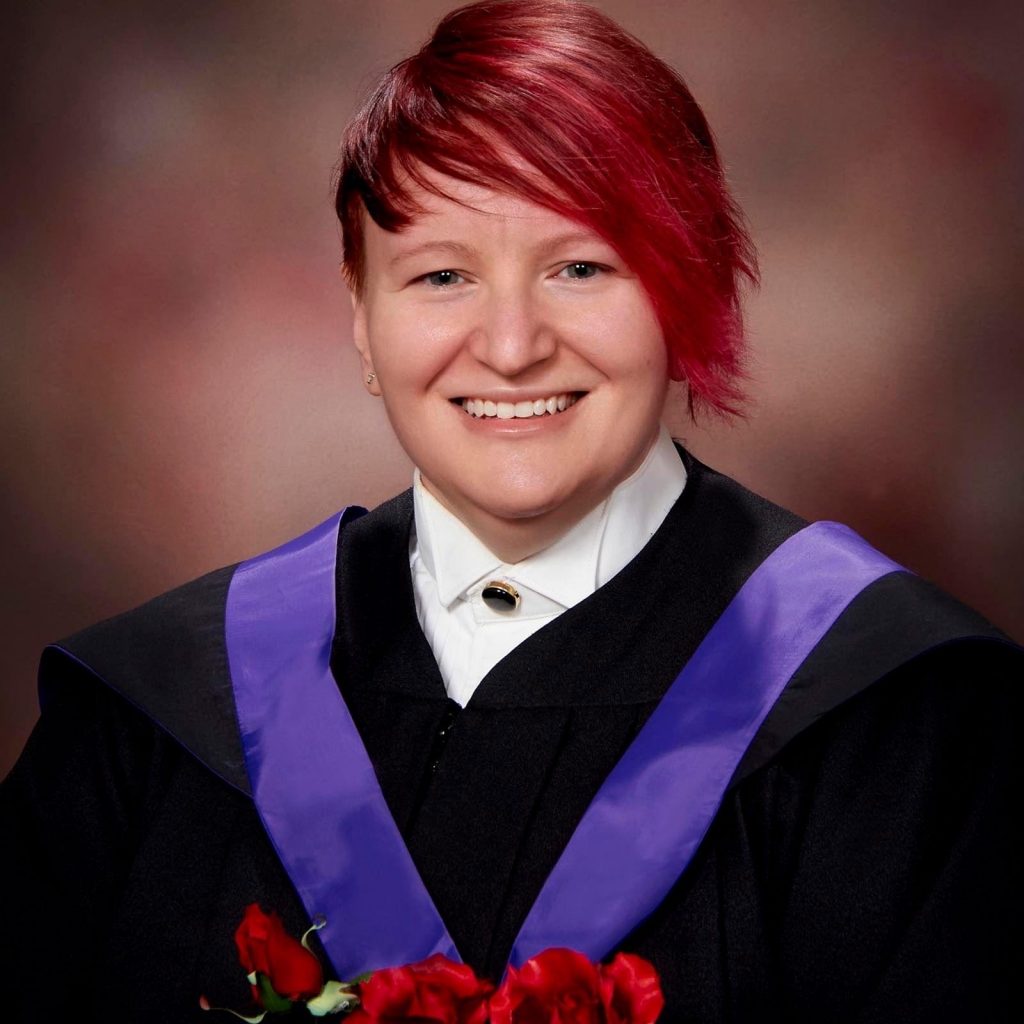
Cynthia Chamber Award recipient
Jessica Irvine (BEd ’08, MEd ’19) is recipient of the CSSE-SCEE Cynthia Chambers Award for her master’s thesis, “Writing and Teaching Curriculum With Relationships in Our Place: A Critical Meta-Analysis of Saskatchewan Core French Curricula’s Cultural Indicators,” which she successfully defended on November 29, 2019. Irvine was supervised by Dr. Heather Phipps. Committee members were
Dr. Valerie Mulholland and Dr. Anna-Leah King. The External Examiner was Dr. Michale Akinpelu, La Cité Universitaire Francophone. The following is an interview with Irvine.
What personal and/or professional circumstances prompted you to take your master’s degree?
I have been a Core French educator with Regina Public Schools since 2008. Primarily, and most recently, I teach elementary, Grades 1-8. When the new elementary Core French curriculum was released in 2010, I felt disconnected to it. I also felt students were disconnected to Core French overall and most complained about having to take it. I couldn’t figure out why that was. I began to question if it was me as a teacher? Or me as a person? I came to a point where I had to find the answers and how to change this negative response to Core French or I’d lose the passion to teach Core French that I’ve had since I was a child.
I also felt overwhelmed by the Core French curriculum, which has outcomes and indicators for student tasks based on the recommendation of 120-200 minutes of French education per week. Students only receive 60-90 minutes typically in a week due to timetable constraints.
Further, the new curriculum introduced several Indigenous cultural knowledge strands. Because I completed my Bachelor of Education in 2008, I did not have any teacher training or education on Indigenous content in the curriculum. To be honest, I was scared to teach it as I wasn’t sure I could or if I’d teach it wrong. For the first few years of the new curriculum, I avoided Indigenous content.
However, in the 2015-2016 school year, when I was teaching a unit about the fur trade, about Carnaval de Québec, to Grades 6 – 8, a student spoke up and said that he wished we learned more about the Indigenous people and their languages in school. He expressed that my lesson on the fur trade is another example that French came after Indigenous languages, so why are they rarely taught? The student had a Cree and Saulteaux background and what he really was asking “Why aren’t we learning more about what’s relevant to me, too?”
His question promoted a class discussion and almost every student had the same final thought when I collected sticky notes—because the Indigenous were here before the French and there is so much intertwined history with both cultures—why is it we are only seeing the one side in schools? Why is it we are only offered Core French at a majority of schools?
This led me to applying for my Master’s of Education, to a course-route program initially. But after the first few classes, I realized that what brought me back to school and learning was my students’ questions which couldn’t be answered unless I confronted the issue full on by writing a thesis on it.
Why did you choose the U of R to do your Master’s degree?
Mainly it was about being able to teach and learn at the same time. I didn’t want to take a leave to go to another university as I felt that I would learn more by teaching at the same time of my learning—really my unlearning, too.
I also wanted to take classes at the U of R because I knew many professors who would be able to help me on this journey. The University’s dedication to reconciliation was important to me.
What was your rationale for framing your research with Senator Sinclair’s (2016) four questions: Where do I come from; where am I going; why am I here; and who am I?
I was fortunate to hear Senator Sinclair speak at the Woodrow Lecture. When I heard him ask these questions, my mind immediately returned to my classroom with my students who were really asking me those exact questions. And I realized, that as their teacher, I didn’t even have the answers to those questions. I had to be able to answer them first if I was ever going to be an educator that helped guide students to their own answers. By framing my research with those questions, I was forcing myself to answer the questions from my students.
What was your initial research question? Did your question change as you researched?
Without recognizing it, my initial research question began in my first course with Dr. Lace Brogden. One of the articles I was assigned to present on was by Dr. Cynthia Chambers. Her theories on land-based learning and culturally appropriate curricula began to inspire me to want to learn more about the land I lived on. My second course, Indigenous Methodologies taught by Dr. JoLee Sasakamoose, was the first of many unlearnings. I encountered many moments of discomfort as I learned new perspectives that were never a part of my previous education. I formed several supportive relationships in this course that I still am blessed to have in my life now. I also took a directed reading course with Dr. Heather Phipps focused on Life Writing and Literary Métissage as an Ethos for Our Times by Dr. Cynthia Chambers, Dr. Erika Hasebe-Ludt, and the late Dr. Carl Leggo. The course and text guided me to my research question. I knew I wanted to find out if or how French and Indigenous languages and culture could both be taught through a Core French program without forgetting my role as a French educator, but also not forgetting that I’m an educator on Treaty 4 lands.
My final research questions that changed and focused over time in my thesis were: Does Saskatchewan’s Core French curricula advocate for Core French programs to integrate Indigenous knowledges, culture, and languages that meets the Truth and Reconciliation Commission’s Calls to Action in Education of culturally appropriate curricula? How can the Saskatchewan Core French curricula make space for both French and Indigenous culture and languages, along with multiple other cultures, in our diverse province?
What were your findings?
Levels 1-7 Core French curricula is not culturally appropriate and has many stereotypes and content that was not integrated with feedback from Indigenous peoples. I think what surprised me the most was that my focus was to determine if the Indigenous content in the cultural indicators were appropriate, but what was also revealed in the focus groups was that the French culture, the culture the curriculum was created for, also had many stereotypes and misconceptions of French culture.
Participants strongly recommended that the curriculum should be rewritten but this time, with educators of Core French, members of the French community, and the Indigenous community invited to the process.
For part of the focus group discussion, it was debated whether or not Indigenous culture even belonged in the Core French curriculum. In the end, all participants, both Indigenous and non-Indigenous strongly agreed that it did as a part of where we live but that the following four foci should be implemented into the curriculum making AND the curriculum teaching process:
- Building relationships. If you are not Indigenous, you need to talk to someone who is an Elder or knowledge keeper. You need to ask permission before teaching Indigenous content so you are guided how to do it, and sometimes you may be told you cannot teach it as you are not qualifeid to share that knowledge. Some knowledges have be taught from the Elders and knowledge keepers.
Teach from your place. The Core French curriculum tried to throw in content from across Canada and the world. Focus on your place whether that be Regina, Treaty 4 or perhaps in Saskatoon on Treaty 6. Teach what is relevant to the students in the environment they live and learn from. - Spiritual content—be very careful of this. It may not be appropriate to teach this from within the classroom as it should be experienced in a real setting.
- We have to find the third space—in Core French, that space is to teach French culture and language but it must allow for other cultures of my place to not be overshadowed. But as a Core French educator, I also can’t forget that my role is to teach French, too. This space needs to allow for learning from others and asking for help when needed, to not assume I am teaching the right thing when it comes to Indigenous cultural indicators, but also to not skip teaching them as I’m afraid to do so.
Describe an “aha” moment for you as you researched your topic?
While the focus groups and myself all had various backgrounds—we really had one common goal—our children. It didn’t matter if anyone disagreed or didn’t see one aspect the same as someone else did. The participants listened to each other, created a safe place for discussion, often changed their perspectives upon hearing another, brought themselves to many uncomfortable conversations, and learned from each other—and came to a common understanding. It wasn’t easy but seeing my participants in this process really showed me that curriculum could be done in a similar way. And that there are people willing to give their time for it, yet often the invitation to the process is not extended. I realized for myself that while I cannot change the curriculum, I can change how I approach it and how I teach it. As one participant said—the curriculum is mainly just a guide.
How has your research changed how you approach teaching and learning?
I see the curriculum completely different. Before I saw it as almost the “bible” that had all the right answers. This has changed. I refer to it for ideas on what to teach but then I seek out the sources I need to teach that content and ask them “What should I or shouldn’t I teach with this?” I feel my connection to where I’m from has deepened, and I put relationships first in my classroom and with my colleagues. Students are excited and eager to learn when I come to their class and it isn’t because it’s French. It’s because I’ve taken the time to understand why I’m teaching Core French and I try to make the program relevant to my students, too.
My passion for this knowledge led me to wanting to build more of a community for Core French educators as well. Often we are the only one in a school building with multiple classrooms. I became lead facilitator for the Community of Practice for Core French educators in Regina Public Schools four years ago, and in the past couple years, I’ve helped bring together a province-wide group of Core French educators where there are optional virtual meetings and Professional Development. It isn’t an official role or even a paid one, but it is a necessary role that my research led me to. The Ministry of Education isn’t going to spend the money to update the curriculum in the near future, but by building relationships with those who teach Core French in my place, whether that be just Regina or the whole province, we can work together to change how we teach the curriculum using the knowledge I’ve gained from the research process and from what the participants have helped me to unlearn and learn.
This is just the beginning as well—I just recently finished my research and I have so much more to learn.
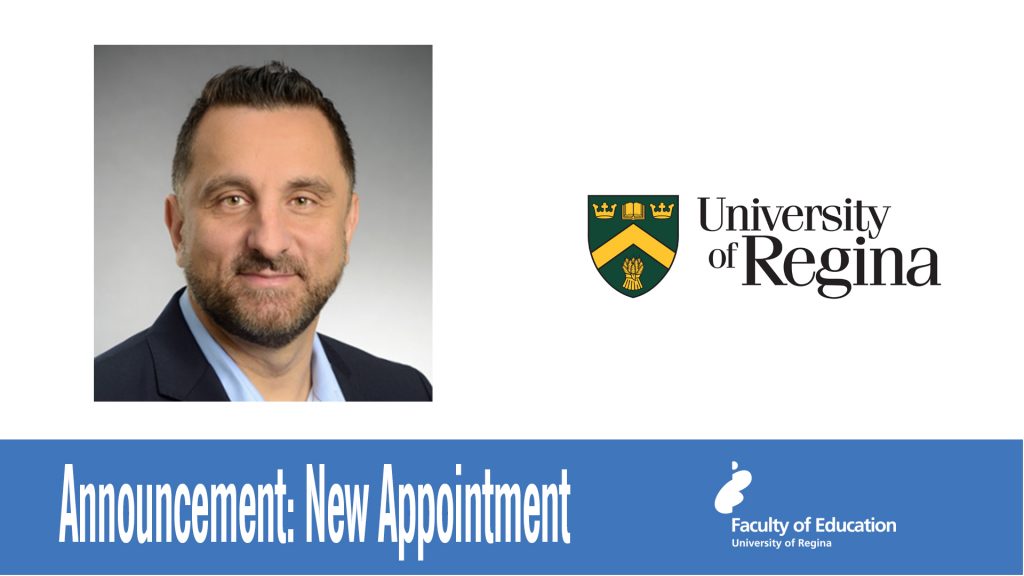
New appointment to the Centre for Teaching and Learning from Faculty of Education
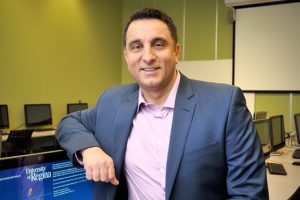
The Faculty of Education’s Dr. Alec Couros has been appointed as the Director of the Centre for Teaching and Learning (CTL) effective September 1, 2020.
Dr. Alec Couros is a Professor of Educational Technology and Media in the Faculty of Education at the University of Regina.
Couros currently serves as the Director of the Centre for Educational Research, Collaboration, & Development (CERCD), the Faculty of Education’s research unit. Couros’s research focuses on the areas of connected/networked/open learning, digital citizenship, social media in education, SoTL, and media/digital literacy. His work spans the traditional academic realm (including numerous book chapters, articles, and Tri-Council grants) but also includes research done in collaboration with government and industry partners. Couros is an internationally recognized expert in his field and has given hundreds of keynotes and workshops around the world to academics, educators, parents, and students. In his tenure as a faculty member at the University of Regina, Couros has been recognized on several occasions for his scholarship, with recent honours including the D2L Innovation Award in Teaching (Scholarship of Teaching and Learning in Higher Education (STLHE), 2018), the University of Regina Alumni Association Award for Teaching Excellence (2016), EdTech Leader of the Year in the Post-Secondary Category (Canadian EdTech Awards, 2016), and the Centre for Teaching and Learning Award for Innovation in Teaching (University of Regina, 2015). Prior to receiving his doctorate from the University of Regina in 2007, Couros held various education-related positions in K-12, technical, youth corrections, and post-secondary institutions. He also holds a Bachelor of Education and Master of Education from the University of Saskatchewan.
Dr. Nilgün Önder
Associate Vice-President Academic
University of Regina
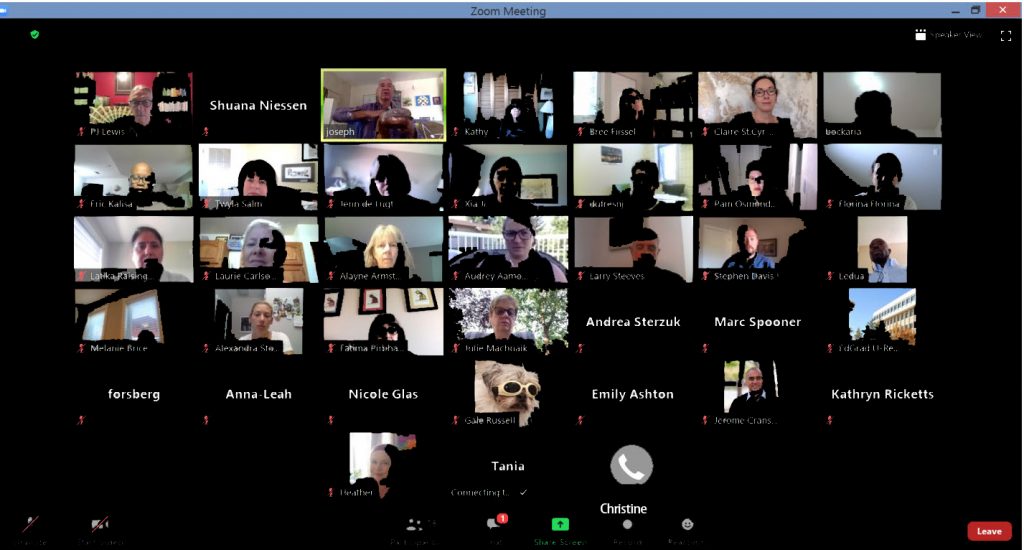
Fall Faculty Retreat
#UREdu faculty and staff gathered via Zoom today for the annual fall retreat. After starting the retreat in a good way with songs, prayers, and smudging by Emerging-Elder-in-Residence Joseph Naytowhow, and a welcome from Dean Jerome Cranston, faculty and staff engaged in a circle time of sharing and support. Following this discussion, faculty and staff were informed about “Foundations Postures: Use of a Good Chair” with Ashley Johnson and then “Mindfulness and Self-massage” with Megan Hoskins. A supportive community and attention to wellness are essential to the success and support of the students we serve, especially during this time of remote working, teaching and learning.
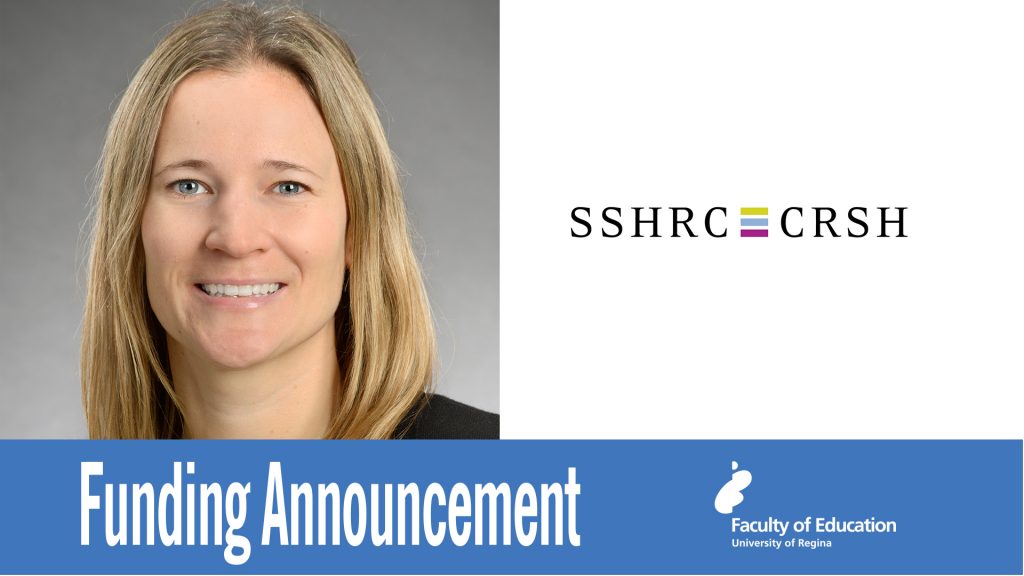
SSHRC Funding Announcement
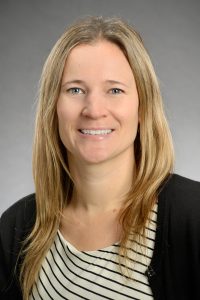 Congratulations to Dr. Cristyne Hébert who has been awarded a SSHRC Insight Development Grant of $64,630.00 for her study entitled “Telling Stories in Multilingual Classrooms: Teacher Professional Development for Multimodal Learning and Assessment.”
Congratulations to Dr. Cristyne Hébert who has been awarded a SSHRC Insight Development Grant of $64,630.00 for her study entitled “Telling Stories in Multilingual Classrooms: Teacher Professional Development for Multimodal Learning and Assessment.”
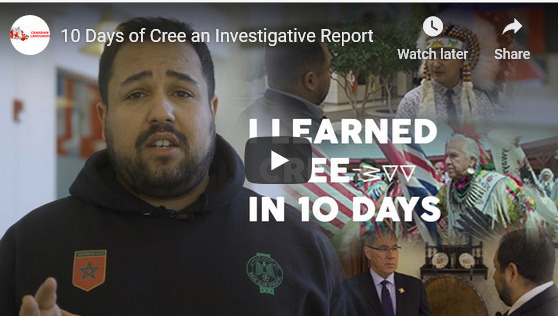
Le Bac student creating film series on Canadian languages
Le Bac #UREdu student Wahbi Zarry and Tony Quiñones have created a 1/2 hour film, 10 Days of Cree, which follows Zarry’s 10-day journey engaging with the larger community while working to learn the Cree language. This is the first of a planned educational webseries exploring Zarry’s experiences with Canadian indigenous languages
Interim President and Vice Chancellor Dr. Thomas Chase writes, “10 Days of Cree is a fine example of the quality work our students produce, and just as importantly, a fine example of reconciliation in action that should inspire and serve as an example for us all – particularly as we work to bring to life our new Strategic Plan, kahkiyaw kiwâhkômâkaninawak.”
Episode 2 on the Nakota language will be released in November. For updates follow Zarry’s Facebook site, Canadian Languages.
Canadian Languages is a webseries exploring indigenous languages of Canada through educational documentaries.
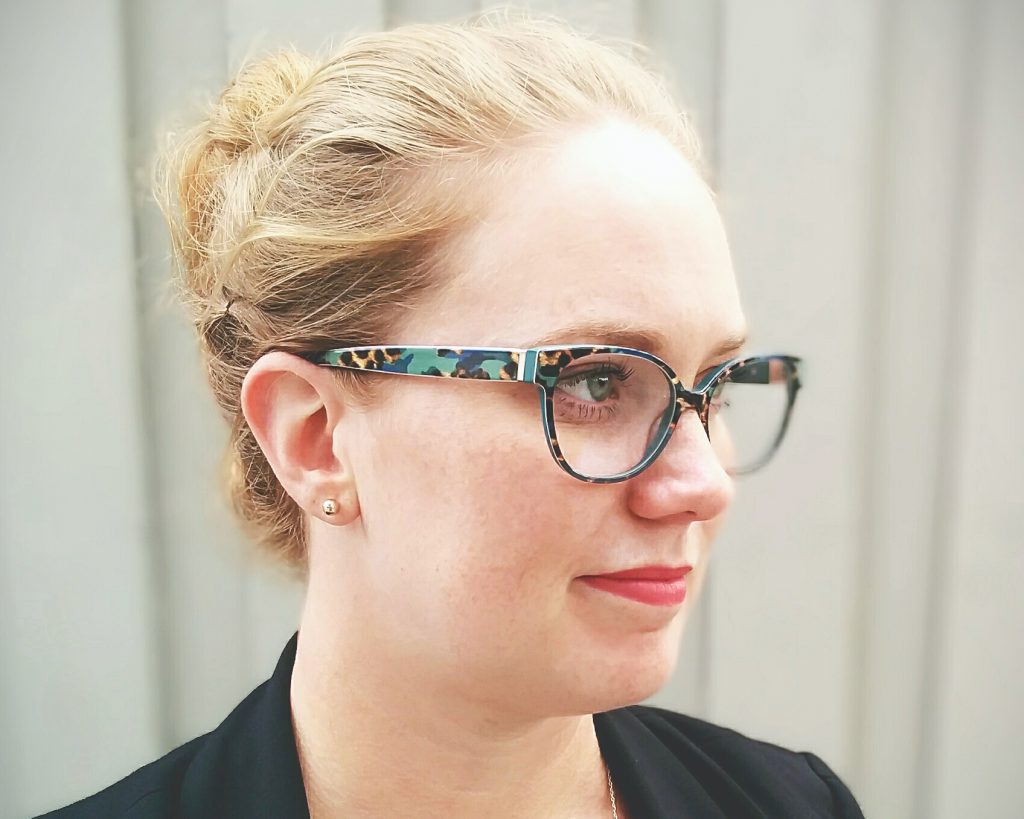
Outstanding Young Alumni Award recipient
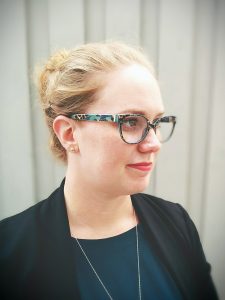
Christine Selinger (BEd’11/BSc’11) is recipient of the URegina 2020 Outstanding Young Alumni Award.
Christine Selinger is a dedicated advocate, athlete, and volunteer. As a student at the University of Regina, she was the first paraplegic woman to traverse the rugged Nootka Trail, became president of several student societies, and was a recipient of the President’s Medal. Today, Christine is a two-time world champion in para-canoe, an educator, and an emerging leader in sexuality and disability.
Christine sustained a spinal cord injury at the age of 19. Subsequently, she completed two concurrent Bachelor’s degrees in Mathematics and Education. She worked as a Peer Support Coordinator for the Canadian Paraplegic Association (CPA) and Spinal Cord Injury (SCI) Ontario. Through her openness and candour about living life with a spinal cord injury, she has had a tremendous impact on the lives of individuals with recent spinal cord injuries.
Christine was a Canadian National ParaCanoe Athlete from 2008–2013, a two-time World Champion, and Saskatchewan Athlete of the Month in August 2010. She was also short-listed as International Paralympic Committee Athlete of the Month in August 2011.
In her professional and personal life, Christine bravely faces challenges to help improve the lives of people with disabilities. Her contributions to promoting women with disabilities in sport and her advocacy for the community of persons with disabilities, particularly related to issues of sexuality, make her an extraordinary member of the University of Regina alumni community. (From 2020 Alumni Crowning Achievement Award Recipients page)
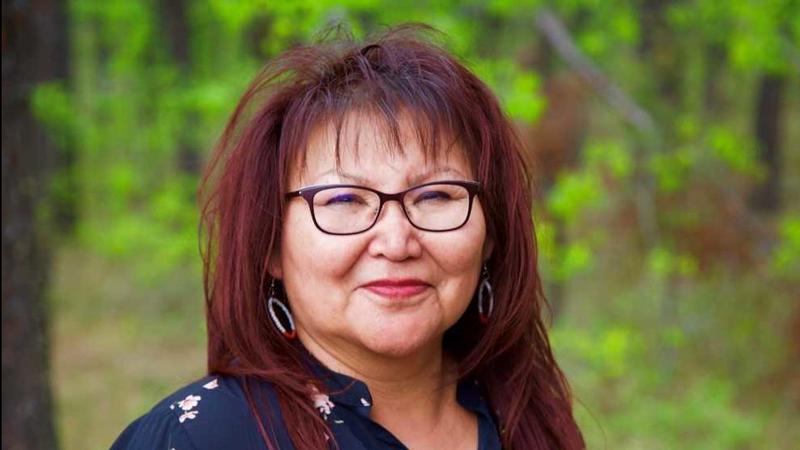
Alumna receives U of R Professional Achievement Award
Alumna Rosalie Tsannie-Burseth MEd’01 is the recipient of the 2020 U of R Professional Achievement Award
Rosalie Tsannie-Burseth has been a leader in education for 30 years as a teacher, a principal, and a Director of Education. She is an advocate for First Nations language and culture and a role model for many, including those in her northern home community of Wollaston Lake.
Rosalie has overcome many obstacles to become the respected trailblazer she is today. She is a Residential School Survivor who was taunted and forbidden to speak her language, yet persevered. She defied cultural expectations with her education and career path, paving the way for other women in her community and beyond.
Rosalie has served as the Director of Education at Hatchet Lake First Nation, as the Chief of her community, and most recently, as Associate Director with the Prince Albert Grand Council. She has received numerous awards, including the Governor General’s Citizenship Award, the Awasis Award, the Role Model Award, Women of the Dawn Award, and the Lieutenant Governor’s Award. She is currently a PhD student with us.
Read news posts from La Ronge Now and Eagle Feather News
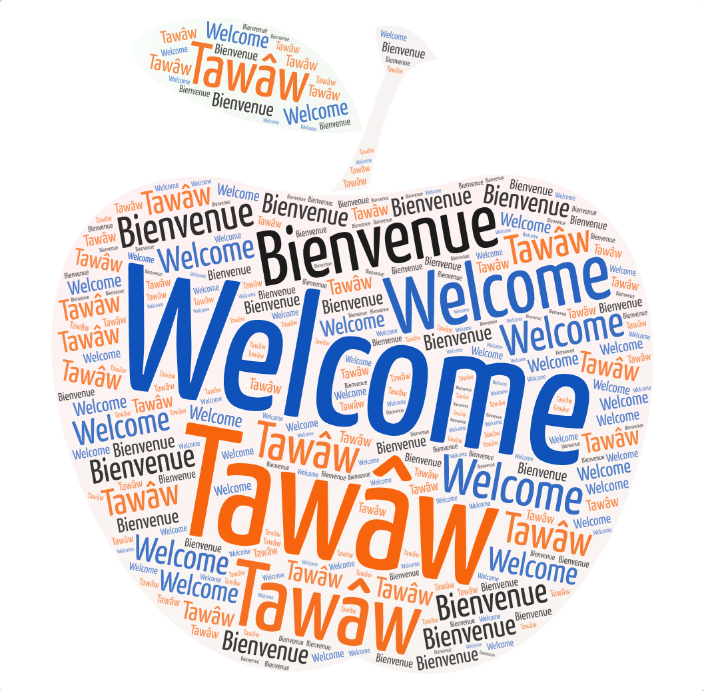
The Faculty welcomes two members
The Faculty of Education welcomes two new one-year term faculty members: Dr. Latika Raisinghani and Dr. Bree Fiissel.
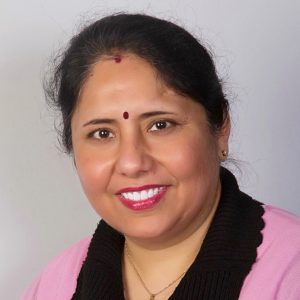
Dr. Latika Raisinghani has accepted a lecturer position in Science and Environmental Education. She has taught as a substitute teacher with Regina Public Schools and has taught Science at the Elementary, Middle Years, and Secondary levels. Prior to February 2020, Dr. Raisinghani was at the University of British Columbia where she received a PhD in Curriculum Studies in Science Education.
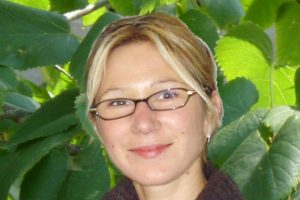
Dr. Bree Fiissel has accepted a lecturer position in Educational Psychology. Dr. Fiissel completed her Masters and PhD in Educational Psychology in the Faculty of Education at the University of Regina and has been a sessional lecturer since 2018 . She has over 24 years of experience in providing therapeutic services to children, youth, adults and families in our local community. Dr. Fiissel is currently the Vice-President of Clinical Services at Ranch Ehrlo.
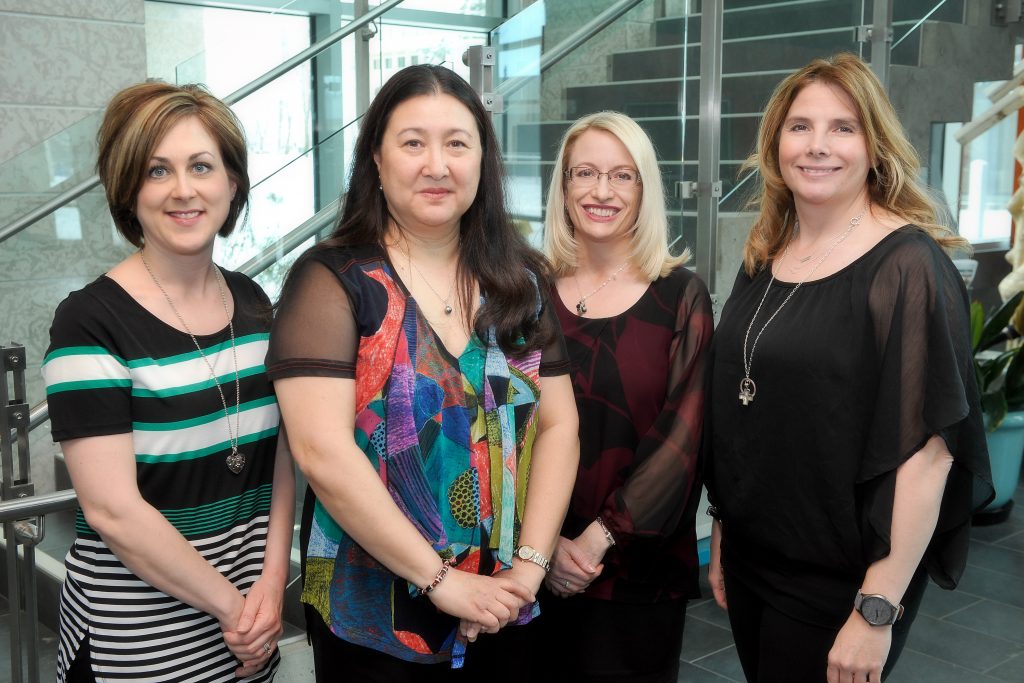
Kristina Lee – Retirement
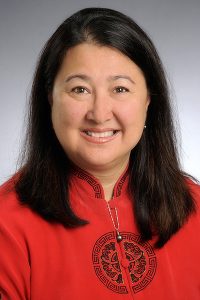 On June 30, 2020 Kristina Lee retired after more than 30 years in the Faculty of Education. Kristina began her first position with the Faculty of Education on Feb. 5, 1990 (almost straight off the plane from Singapore). The University of Regina, Faculty of Education has been her sole employer since her arrival in Canada. Kristina has worked closely with five Associate Deans during her career: Dr. Louisa Kozey, Dr. Caroline Krentz, Dr. Nick Forsberg, Dr. Heather Ryan and Dr. Val Mulholland.
On June 30, 2020 Kristina Lee retired after more than 30 years in the Faculty of Education. Kristina began her first position with the Faculty of Education on Feb. 5, 1990 (almost straight off the plane from Singapore). The University of Regina, Faculty of Education has been her sole employer since her arrival in Canada. Kristina has worked closely with five Associate Deans during her career: Dr. Louisa Kozey, Dr. Caroline Krentz, Dr. Nick Forsberg, Dr. Heather Ryan and Dr. Val Mulholland.
Kristina also remembers former Deans including Dr. Bob Bryce, Dr. George Rickett, Dr. Michael Tymchak, Dr. Margaret McKinnon, Dr. James McNinch, Dr. Jennifer Tupper, and Dr. Andrea Sterzuk and her career concludes in the role of Executive Assistant to our current Dean, Dr. Jerome Cranston. Kristina says that she has seen many changes over the years and seen the Faculty go through good and hard times. Kristina is also grateful for the opportunity to earn her BEd degree in Adult Education and Training while employed at the University.
